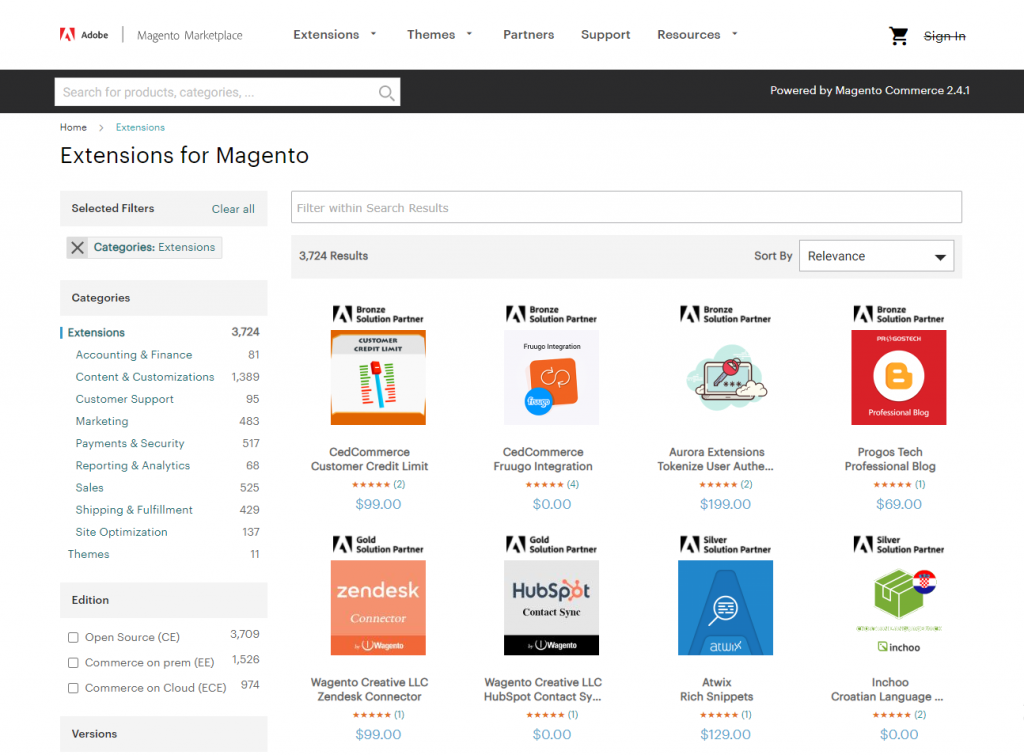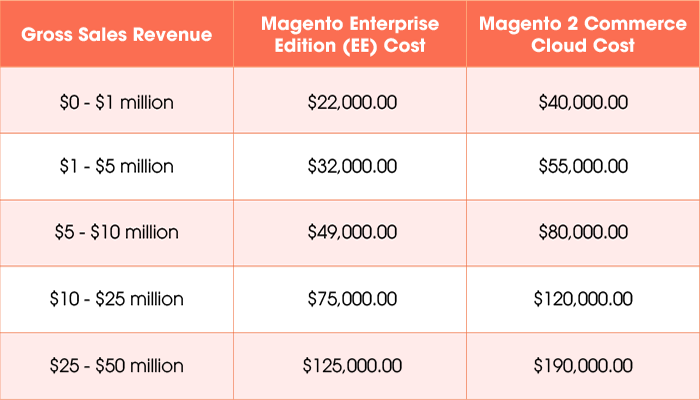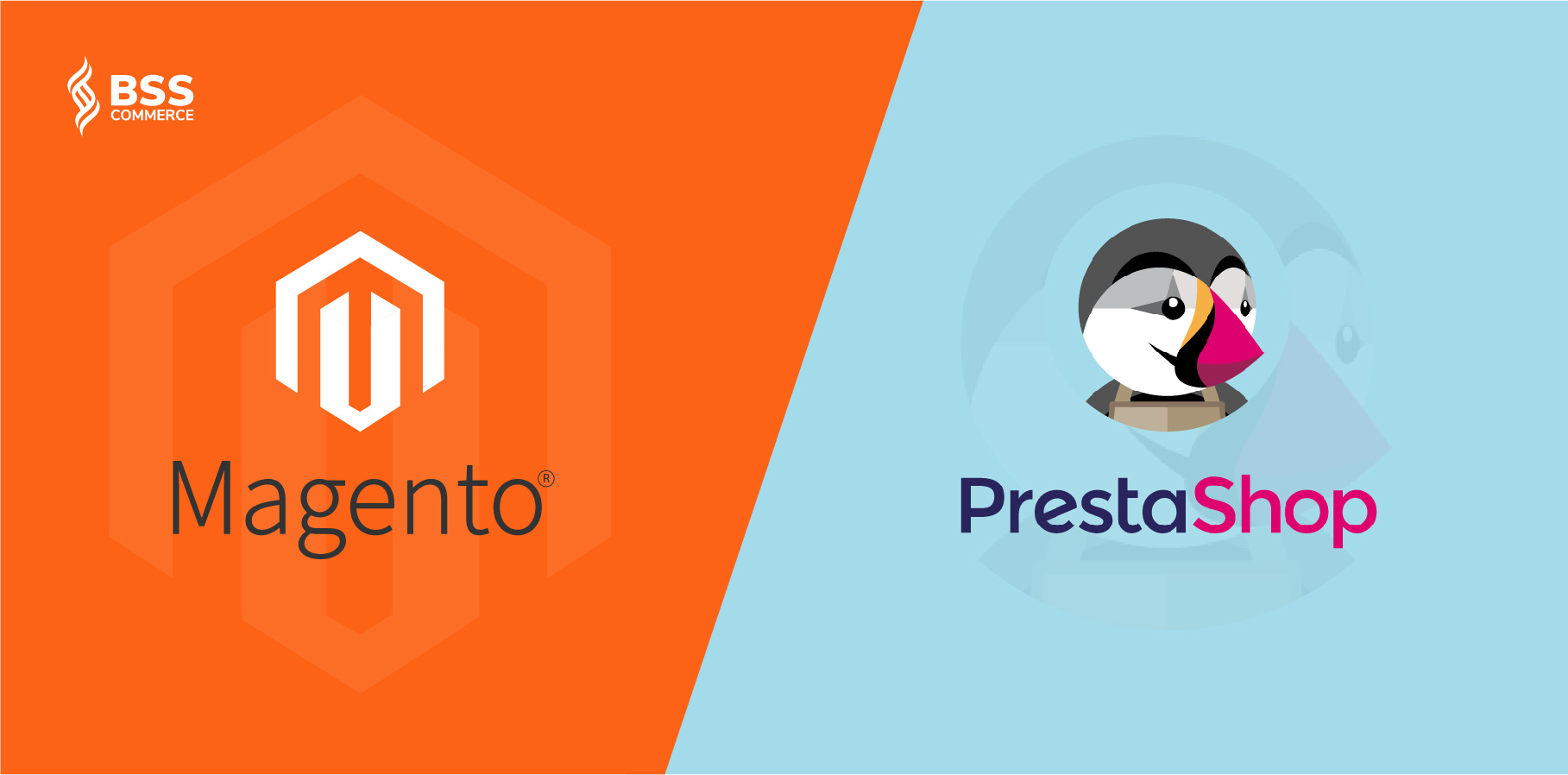With the diversity of eCommerce platforms, choosing a suitable one to start an online store is not always easy. There are several aspects that store owners will need to evaluate before engaging with any platform, including detailed features, pricing, accessible support, and so on.
You will always seek the greatest Magento alternatives in the market if you have an idea to develop an E-commerce website or are trying to choose an E-commerce platform to build your website.
Magento vs PrestaShop, despite being popular platforms with significant market share compared to others, are not perfect choices for every business. The E-commerce sector is currently governed by these platforms. A thorough examination of Magento vs. Prestashop will assist you in making the best decision.
Still wondering about “Magento or PrestaShop” or “Magento 2 vs Prestashop”? This blog will provide you with an overall comparison to help you select a suitable one.
Magento vs PrestaShop: A Quick Breakdown
Table of Contents
Magento

Originally developed in 2007 by Varien, Magento is an open-source eCommerce platform written in PHP. So far, it has become one of the most popular CMSs with various products and versions. According to the latest statistics, Magento has powered over 250,000 eCommerce sites with more than 2.5 million downloads.
For those who haven’t known how many editions Magento offers, the topic Magento Open Source vs Magento Commerce will provide a full comparison that answers your question. Besides, if you are interested in an option that includes hosting, Magento Commerce Cloud (Magento ECE) is the most premium edition you must know.
| Magento Open Source | Magento Commerce | Magento Commerce Cloud | |
| Built-in Functionalities | Yes | Yes | Yes |
| Advanced Native Functionalities | Yes | Yes | |
| Technical Support | Yes | Yes | |
| Hosting & Performance | Yes |
Magento provides a wide range of functionality as well as a great deal of flexibility. As a result, you will have complete control over the E-commerce solution, including the appearance, content, and functionality. Magento users have access to a wide range of extensions, features, and modules. It’s great for professional online retailers and anyone who works full-time or part-time to run an internet business.
To understand more about the Magento platform, please read this article: What Is Magento ECommerce and All You Need to Know About It
Prestashop

Like Magento Open Source, PrestaShop is a freely accessible eCommerce platform written in PHP. No monthly fees or commissions are required like using Magento. Up to now, this eCommerce platform has been chosen by 300,000+ online shops across the globe and is available in 60 different languages.
Prestashop, too, provides a plethora of user-friendly features. You can use the basic layout for free, but you’ll have to pay if you want to use more advanced features for your online business. Prestashop’s primary customers are small and medium-sized businesses wishing to establish an online presence. They don’t offer official assistance, but the Prestashop forum has a lot of authorized Prestashop developers.
>>> CHECK OUT Magento vs Drupal and Magento vs Bigcommerce for more eCommerce solutions.
Now, let’s find out what is the difference between Magento and Prestashop in the next section and choose the best fit for your online business.
Magento vs PrestaShop: Which One is Better?
1. Design & templates
Both Magento 2 vs PrestaShop themes are elegant, professional, and modern. According to design, don’t worry that you cannot find a theme matching your needs because both platforms have a massive number of themes.
The PrestaShop team designs templates by themselves. Users of the platform are encouraged to visit the PrestaShop Addons Marketplace for 2400+ free and paid PrestaShop templates that will give your store additional built-in features like a color switcher, mega menu, and front editor if you wish.
With Magento, the difference comes from a vast supply of third-party providers. As a result, Magento offers you more variants of design to choose from. You can reach out to a huge quantity of themes and easily find an ideal theme from theme providers like ThemeForest. Especially, you can also build your own theme once you have the necessary coding skills.
Winner: Magento
2. Usability
In terms of usability, both platforms support basic eCommerce functionalities. However, Magento still stands out with more robust features, allowing businesses to deliver a seamless experience to their customers. Especially, Magento 2 Commerce edition provides a lot of exclusive features that B2C/B2B businesses will love :
- Customer segmentation
- Gift registries
- Events & Private sales
- Rule-based related products
- Rewards & Loyalty
- Visual merchandiser
- Quick order (B2B)
- Company credit (B2B)
- Quotes (B2B)
- …
>>> DIG INTO Magento’s detailed features with Everything You Need to Know about Magento.
Furthermore, Magento is a powerful e-commerce platform in terms of B2B business. Magento Commerce edition does support built-in B2B modules to support the wholesale business to enhance shopping experience and management. For the Open source edition, there are a lot of Magento 2 B2B modules to bring more functionality for wholesale online stores.
Is a Prestashop online store functional enough?
Prestashop supports more than 500 already-built-in features. Some unique features are Intelligent Merchant KPI and Forecasting which enhance its statistical facilities. It also includes integrations that will enable you to export product listings directly to eBay, Amazon, Google Shopping, and other popular marketplaces.
In short, if you need robust eCommerce features, Magento is a perfect choice. Otherwise, if a basic one is enough, Prestashop is worth considering.
3. Security
Security is a sensitive aspect that can lead to serious losses for eCommerce. For this reason, it’s no surprise that both Magento vs Prestashop offer excellent security measures to avoid security breaches.
Magento continuously releases updated security patches to close any vulnerabilities that arise. Therefore, it offers a level of security you don’t see with Prestashop. Besides, the platform also allows you to install robust plugins to ensure the secure state of your eCommerce website.
With Prestashop, there is a self-hosted version available for download. Many users host their sites with Prestashop. If you expect a higher security level, it’s usually better to have control over the environment and access to a support team. Accordingly, we recommend a self-hosted solution regardless of which application you pick.
4. Performance & Scalability
To scale up, the capability of handling traffic spikes is necessary. On the contrary, don’t be surprised if your site goes into slow speed and lags and errors arise when it deals with surges of visits during special events like Black Friday Sales, Cyber Monday Sales, and so on.
Magento is a robust CMS that is capable of coping with up to 50,000 visits/hour. Indeed, it has made both client-side, server-side, and database improvements to gain the stability and scalability that large enterprises need.
For example, Magento offers several optimizations that reduce the amount of data that must be passed to the browser in order to render the webpage. This finally decreases page weight and reduces response time. The server response time is also shortened thanks to the integration with Varnish page caching.
At this point, Magento is doing better than PrestaShop.
5. SEO & Marketing
Both Magento vs PrestaShop provide users with critical features to optimize your website in terms of SEO such as URL modification, canonical tags, 301 redirects, and so on. However, PrestaShop users will have to install modules for some SEO settings while on the Magento platform, they are originally available.
| SEO features | Magento | PrestaShop |
| Page title | Available | Available |
| Meta description | Available | Available |
| Personalized URL | Available | Available |
| 301 redirects | Can manually adjust in Magento internal URL Rewrite Management system or use extensions | Can manually adjust it in the root folder |
| Sitemap | Available | Modules required |
| Canonical tag | Available | Available |
| Google tools | Available | Modules required |
Furthermore, the Magento Commerce edition also offers other premium marketing tools like customer segmentation and targeting as discussed above, or analytics and report generators.
Winner: Magento
6. Plugin & extensions
White Magento Enterprise edition comes with exclusive features that every store owner will love, Magento Marketplace offers 5.600+ extensions for Magento stores so users of the Community edition can pick any compatible extensions for out-of-the-box functionalities.
Extensions in Magento Marketplace are categorized into groups, from Content & customization, Sales, Payment & Security, Shipment & Fulfillment, to Site Optimization. All of them have been reviewed strictly by Magento’s QA team in technical and content aspects before being officially listed. No matter whether you are seeking a free or premium one, this store can fulfill your needs.

PrestaShop slightly exceeds Magento in module quantity. Users of this platform can access about 3800 modules from Prestashop Marketplace to extend their store’s capacities in a few clicks.

Winner: PrestaShop
7. Easy of use
The tricky part of using Magento comes from manual installation, setups, and customization, which involve coding skills. For example, you might deal with steps like transferring files via FTP and running several commands. These jobs can be complicated for amateur users to handle.
If you are a non-technical user, the time-saving solution is asking for dedicated support from developers or Magento Web Development agencies to get your site up. Afterward, daily operations will be simpler since Magento has so far gained substantial improvements to the backend interface since the Magento 2.0 version. The backend admin of this platform has been much more intuitive and user-friendly.
Compared with Magento, PrestaShop would be an easier game if you are tech-challenged. The customization on a PrestaShop site is less complex because the platform has simplified the daily management to help admins focus on important issues.
Winner: PrestaShop
8. Pricing
Magento offers a free edition called Magento Community Edition or Magento Open Source. You can download the program code without any payment and freely customize it according to your business needs. But please note that you still have to pay for web hosting.
On the other hand, an annual fee is applied to the paid plans, which escalates with the business’s annual revenue. With Magento Commerce, the cost starts from $22,000 if your revenue does not exceed $1 million. Similarly, Magento Commerce Cloud costs around $40,000 according to the relevant range of revenue.

>>> Estimate your project’s cost with All Must-Know Magento Costs to build a basic to custom website.
Being an open-source shopping cart, PrestaShop is free to download but users have to pay for the web hosting if you go for a one-click hosted solution and usually needs additional modules and a responsive template to build a functional website. The platform has two editions:
- A downloadable platform (Open Source)
- A cloud-based eCommerce system
For SMEs, the cost of running Magento and PrestaShop is not significantly different. When it comes to enterprise-level businesses, Magento is more costly but gives you a lot of built-in functionalities in return.
9. Support
Depending on Magento editions, users will experience different degrees of support. Magento Community users can only seek help from official documentation and communities. Some of the most popular sources are Magento Help Center, Magento DevDocs, Magento Forums, or Magento partners’ blogs like BSS Commerce Confluence Blog. Meanwhile, Magento Enterprise users can reach out to the official full-fledged support via email or live support.
With PrestaShop, support service requires payment under support plans. For example, the “PrestaShop Support Plan” including speedy support and expert consultancy will charge you from 249€ to 1399€ depending on the support level.
>>> GET more choices of eCommerce platforms with Magento vs Opencart and Magento vs Woocommerce NOW!
Conclusion: The Ideal Platform for Your Business
All in all, there is no absolute conclusion that Magento vs PrestaShop outperforms the other. Each platform has its advantages and disadvantages. The decision depends on your business scale and what your priorities are.
For PrestaShop, despite being an open-source cart, this platform is easy to use and manage. It covers all of the key eCommerce features with thousands of add-ons to satisfy. The open-source nature makes the platform flexible to customize. PrestaShop, for these reasons, would be ideal for beginners or SMEs that aim at cost-efficiency.
On the contrary, store owners might not equally favor Magento regarding ease of use and pricing. However, Magento performs excellently when it comes to large-scale units. Many top-notch brands have selected Magento. While small firms usually prefer the free edition, Magento Commerce would be a perfect solution for large-scale businesses.
More importantly, if you’re also considering Magento vs Shopify vs BigCommerce – three giants in the eCommerce world, then you can’t skip this article.
BSS Commerce is one of the leading Magento extension providers and web development services in the world. With experienced and certified Magento developers, we commit to bringing high-quality products and services to optimize your business effectively. Furthermore, we offer FREE Installation – FREE 1-year Support and FREE Lifetime Update for every Magento extension.
>>> If you are looking for an exceptional solution to enhance your Magento store, you can take a look at our full Magento Website Development services right now!
CONTACT NOW to let us know your problems. We are willing to support you every time.




